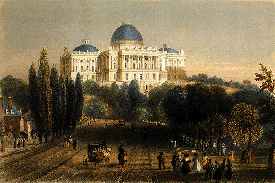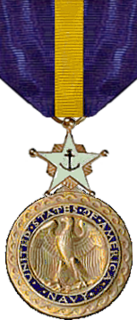William Dickson defeated John Reah, George W. Campbell, and John Cocke to begin the 7th Congress in place of William C. C. Claiborne.
| Elections in Tennessee |
|---|
 |
William Dickson defeated John Reah, George W. Campbell, and John Cocke to begin the 7th Congress in place of William C. C. Claiborne.

William the Lion, sometimes styled William I and also known by the nickname Garbh, "the Rough", reigned as King of Scots from 1165 to 1214. His 48-year-long reign was the second longest in Scottish history.

The 20th United States Congress was a meeting of the legislative branch of the United States federal government, consisting of the United States Senate and the United States House of Representatives. It met in Washington, D.C. from March 4, 1827, to March 4, 1829, during the third and fourth years of John Quincy Adams's presidency. The apportionment of seats in the House of Representatives was based on the Fourth Census of the United States in 1820. Both chambers had a Jacksonian majority.

The Navy Distinguished Service Medal is a military decoration of the United States Navy and United States Marine Corps which was first created in 1919 and is presented to sailors and Marines to recognize distinguished and exceptionally meritorious service to the United States while serving in a duty or position of great responsibility.

The 53rd United States Congress was a meeting of the legislative branch of the United States federal government, consisting of the United States Senate and the United States House of Representatives. It met in Washington, D.C. from March 4, 1893, to March 4, 1895, during the first two years of Grover Cleveland's second presidency. The apportionment of seats in the House of Representatives was based on the Eleventh Census of the United States in 1890.

The 56th United States Congress was a meeting of the legislative branch of the United States federal government, composed of the United States Senate and the United States House of Representatives. It met in Washington, D.C. from March 4, 1899, to March 4, 1901, during the third and fourth years of William McKinley's presidency. The apportionment of seats in this House of Representatives was based on the Eleventh Census of the United States in 1890. Both chambers had a Republican majority. There was one African-American member, George Henry White of North Carolina, who served his second and final term as a Representative in this Congress, and would be the last black member of Congress until 1928, and the last black member of Congress from the South until 1972.

The 55th United States Congress was a meeting of the legislative branch of the United States federal government, composed of the United States Senate and the United States House of Representatives. It met in Washington, DC from March 4, 1897, to March 4, 1899, during the first two years of William McKinley's presidency. The apportionment of seats in the House of Representatives was based on the Eleventh Census of the United States in 1890. Both chambers had a Republican majority. There was one African-American member, George Henry White, a Republican from the state of North Carolina.

The 50th United States Congress was a meeting of the legislative branch of the United States federal government, consisting of the United States Senate and the United States House of Representatives. It met in Washington, D.C. from March 4, 1887, to March 4, 1889, during the third and fourth years of Grover Cleveland's first presidency. The president vetoed 212 pieces of legislation, the greatest number in a single session of Congress.

The 41st United States Congress was a meeting of the legislative branch of the United States federal government, consisting of the United States Senate and the United States House of Representatives. It met in Washington, D.C. from March 4, 1869, to March 4, 1871, during the first two years of Ulysses S. Grant's presidency. The apportionment of seats in the House of Representatives was based on the Eighth Census of the United States in 1860. Both chambers had a Republican majority.

The 42nd United States Congress was a meeting of the legislative branch of the United States federal government, consisting of the United States Senate and the United States House of Representatives. It met in Washington, D.C. from March 4, 1871, to March 4, 1873, during the third and fourth years of Ulysses S. Grant's presidency. The apportionment of seats in the House of Representatives was based on the Eighth Census of the United States in 1860. Both chambers had a Republican majority.

The 52nd United States Congress was a meeting of the legislative branch of the United States federal government, consisting of the United States Senate and the United States House of Representatives. It met in Washington, D.C. from March 4, 1891, to March 4, 1893, during the final two years of Benjamin Harrison's presidency.

William Chapman Hewitson was a British naturalist. A wealthy collector, Hewitson was particularly devoted to Coleoptera (beetles) and Lepidoptera and, also, to birds' nests and eggs. His collection of butterflies, collected by him as well as purchased from travellers throughout the world, was one of the largest and most important of his time. He contributed to and published many works on entomology and ornithology and was an accomplished scientific illustrator.
The 1906 Birthday Honours for the British Empire were announced on 29 June, to celebrate the birthday of Edward VII on 9 November.
The 1910 Birthday Honours for the British Empire were announced on 24 June, to mark the occasion of the day set apart to celebrate the birthday of the late King Edward VII, who had died on 6 May. In the circumstances, the list was notably shorter than in preceding years.
The 1905 Birthday Honours for the British Empire were announced on 30 June, to celebrate the birthday of Edward VII on 9 November.
The Queen's Birthday Honours 1886 were granted in celebration of the 24 May birthday of Queen Victoria. They were announced in the London Gazette of 28 May 1886.